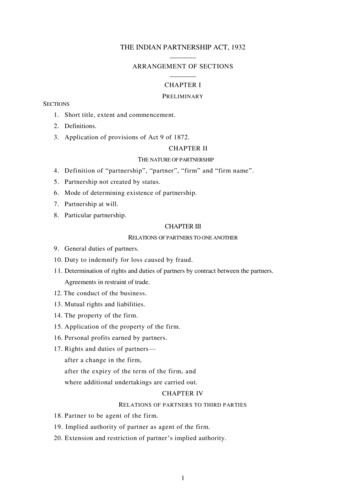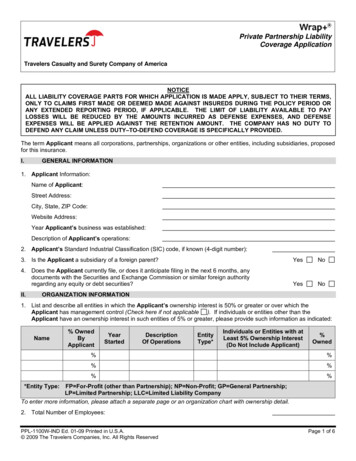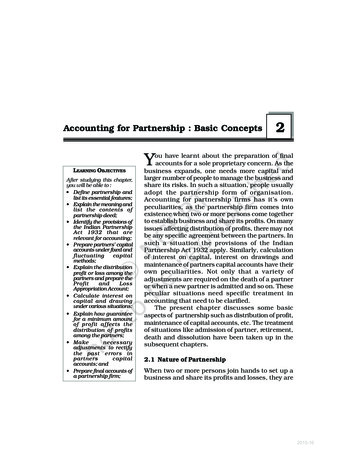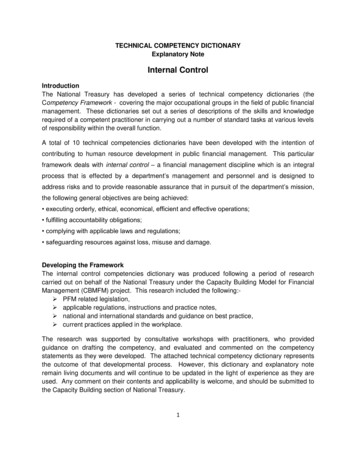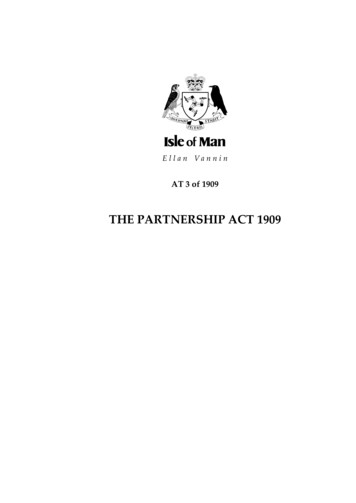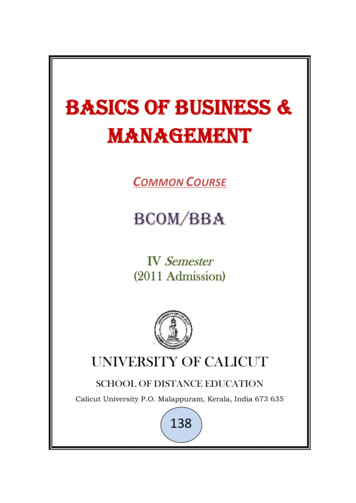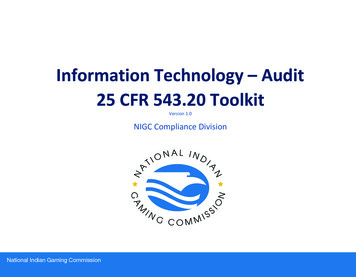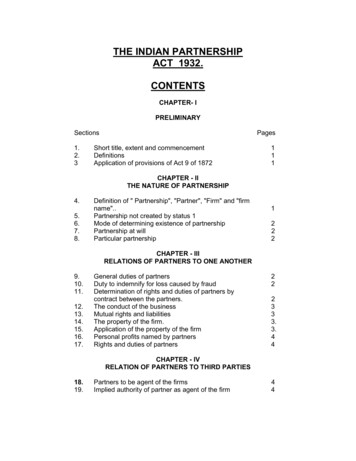
Transcription
THE INDIAN PARTNERSHIPACT 1932.CONTENTSCHAPTER- IPRELIMINARYSections1.2.3PagesShort title, extent and commencementDefinitionsApplication of provisions of Act 9 of 1872111CHAPTER - IITHE NATURE OF PARTNERSHIP4.5.6.7.8.Definition of " Partnership", "Partner", "Firm" and "firmname".Partnership not created by status 1Mode of determining existence of partnershipPartnership at willParticular partnership1222CHAPTER - IIIRELATIONS OF PARTNERS TO ONE ANOTHER9.10.11.12.13.14.15.16.17.General duties of partnersDuty to indemnify for loss caused by fraudDetermination of rights and duties of partners bycontract between the partners.The conduct of the businessMutual rights and liabilitiesThe property of the firm.Application of the property of the firmPersonal profits named by partnersRights and duties of partners222333.3.44CHAPTER - IVRELATION OF PARTNERS TO THIRD PARTIES18.19.Partners to be agent of the firmsImplied authority of partner as agent of the firm44
ii20.21.22.23.2425.26.27.28.29.30.The Indian Partnership Act, 1932ContentsExtension and restriction of partner's impliedauthority.Partner's authority in an emergencyMode of doing act to bind firmEffect of admissions by a partnerEffect of notice to acting partnerLiability of a partner for acts of the firmLiability of the firm for wrongful acts of a partner.Liability of firm for misapplication by partnersHolding outRights of transferee of a partner's interestMinors admitted to the benefits of partnership.5555555555CHAPTER - VINCOMING AND OUTGOING PARTNERS.31.32.33.34.35.36.37.38.Introduction of a partnerRetirement of a partnerExpulsion of a partnerInsolvency a partnerLiability of estate of deceased partnerRights of outgoing partner to carry on competing businessRight of outgoing partner in certain cases to sharesubsequent profitsRevocation of continuing guarantee by change in firm77778888CHAPTER -VIDISSOLUTIONOF A FIRM39.4041.42.43.44.45.46.47.48.49.50.Dissolution of firmDissolution by agreementCompulsory dissolutionDissolution on the happening of certain contingenciesDissolution by notice of partnership at willDissolution by theLiability for acts of partners done after dissolutionRight of partners to have business wound up afterdissolution.Continuing authority of partners for purposes of winding upMode of settlement of accounts between partnersPayment of firm debts and of separate debts.Personal profits earned after dissolution88899101010101111
iii51.52.53.54.55.The Indian Partnership Act, 1932ContentsReturn of premium on premature dissolutionRights where partnership contract is rescinded for fraudor misrepresentationRights to restrain from use of firm name or firm propertyAgreements in restraint of tradeSale of good will after dissolution1111111212CHAPTER - VIIREGISTRATION OF 71.Power to exempt from application of this ChapterAppointment of RegistrarApplication of registrationRegistrationRecording of alterations in firm name and principalplace of business.Noting of closing and opening of branchesNoting of changes in names and addresses of partnersRecording of changes in and dissolution of a firmRectification of mistakesAmendment of Register by order of courtInspection of Register and filed documentsGrant of copiesRules of evidenceEffect of non- registrationPenalty for furnishing of false particularsPower to make rules1212.1213131313131414141414141515CHAPTER - VIIISUPPLEMENTAL72.73.74.Mode of giving public notice[Repeals]Saving***********161616
THE INDIAN PARTNERSHIP ACT , 1932.(ACT NO.9 OF 1932)(8th April,1932)An Act to define and amend the law relating to partnership.WHEREAS it is expedient to define and amend the law relating topartnership, It is hereby an acted as follows:CHAPTER - I- PRELIMINARY1.Short title extend and commencement - (1) This Act may becalled the Indian partnership Act. 1932.2.3.2.It extends to the whole of India except the State ofJammu & Kashmir.It shall come int0 force on the Ist day of October , 1932,except Sec. 69 which shall come into force on the Ist dayOctober, 1933.Definitions - In this Act, unless there is anything repugnant inthe subject or context a)b)c)d)e)An " act of a firm" means any act or omission by all thepartners, or by any partner or agent of the firm whichgives rise to a right enforceable by or against the firm":" business" includes every trade, occupation andprofession."Prescribed" means prescribed by rules made under thisAct""Thirdy party " used in relation to a firm or to a partnertherein means any person who is not a partner in thefirms" andexpression used but not defined in this Act and defined inthe Indian3.Application of provisions of Act 9 of 1872 - The unrepealedprovisions of the Indian contract Act, 1872 , save in so far as they areinconsistent with the express provision of this act, shall continue toapply to firmsCHAPTER - II - THE NATURE OF PARTNERSHIP4.Definition of " Partnership", "partner", firm" and "firmname"- "Partnership" is the relation between persons who have agreedto share the profits of a business carried on by all or any of them actingfor all.
Persons who have entered into partnership with one another arecalled individually " partners" and collectively " a firm" , and the nameunder which their business is carried on is called the " firm name"Short Note'-Sec.4- Partnership is an association of persons carrying business & inlaw the firm name is compendious method of describing partnersDeoha F.Guzdar Bombay us C.I.T. Air, 1955 SC 74.5- Partnership not created by status- The relation of partnershiparises from contract and not from status:and, in particular, the members of a Hindu undivided familycarrying on a family business as such, or a Burmese Buddhisthusband and wife carrying on business as such, are notpartners in such business.Mode of determining extence of partnership - In determining6.whether a group of persons is or is not a firm, or whether a person is oris not partner in a firm, regard shall be had to the real relation betweenthe parties, as shown by all relevant facts taken together.Explanation1. The sharing of profits or of gross returns arisingfrom property by persons holding a joint or common interest in thatproperty does not of itself make such persons partners.Explanation2The receipt by a person of a share ofthe profits of a business, or of a payment contingent upon the earningof profits or varying with the profits earned by a business, does not ofitself make him a partner with the persons carrying on the business ;and i, particular, the receipt of such share or payment a)by a lender of money to persons engaged or about toengage in any business.b)c)by a servant or agent as remuneration.by the widow or child of a deceased partner, as annuity,ord)by a previous owner or part owner of the business , asconsideration for the sale of the goodwill or share thereof.does not of itself make the receiver a partner with the personscarrying on the business.Partnership at will - Where no provision is made by contract7.between the partners for the duration of their partnership, or for thedetermination of their partnership, the partnership is " Partnership atwill"Particular partnership - A person may become a partner with8.another person in particular adventures or undertaking
CHAPTER -III RELATIONS OF PARTNERS TO ONE ANOTHERGeneral Duties of partners- Partners are bound to carry on9.the business of the firm to the greatest common advantage, to be justand faithful to each other, and to render true accounts and fullinformation of all things affecting the firm to any partner or his legalrepresentative.SHORT NOTE-sec.9- Sleeping partner can file a suit for rendition of account - SitaRam vs. Radha Rai, AIR 1968 SC 534.10.Duty to indemnify for loss caused by fraud- Every partnershall indemnify the firm for any loss caused to it by his fraud in theconduct of the business of the firm.11.Determination of rights and duties of partners by contractbetween the partners: (1) Subject to the provisions of this Act, themutual rights and duties of the partners of a firm may be determined bycontraft between the partners, and such contract may be expressed ormay be implied by a course of dealing.Such contract may be varied by consent of all the partners, andsuch co0nsent may be expressed or may be implied by a course ofdealing.Agreements in restraints of trade- Notwithstanding any2)thing contained in Sec. 27 of the Indian Contract Act, 1872,such contracts may provide that a partner shall not carry on anybusiness other than that of the firm while he is a partner.The conduct of the business- Subject to contract between the12.partnersa)Every partner has a right to take part in the conduct of thebusiness.b)Every partner is bound to attend diligently to his duties inthe conduct of the business.c)any difference arising as to ordinary matters connectedwith the business may be decided by a majority of thepartners, and every partner shall have the right toexpress his opinion before the matter is decided, but nochange may be made in the nature of the businesswithout any consent of all the partners andd)every partner has a right to have access to and to inspectand copy any of the books of the firm .
Mutual rights and liabilities - Subject to contract between the13)partners a)a partner is not entitled to receive remuneration for takingpart in the conduct of the business;b)The partners are entitled to share equally in the profitsearned, and shall contribute equally to the lossessustained by the firm.c)Where a partner is entitled to interest on the capitalsubscribed by him such interest shall be payable only outof profits.d)a partner making, for the purposes of the business, anypayment or advance beyond the amount of capital he hasagreed to subscribe, is entitled to interest thereon at therate of six per cent, per annume)The firm shall indemnify a partner in respect of paymentsmade and liabilities incurred by him.f)i)In the ordinary and proper conduct of the business,andii)In doing such act, in an emergency, for thepurpose of protecting the firm from loss as wouldbe done by a person of ordinary prudence, in hisown case, under similar circumstances anda partner shall indemnify the firm for any loss caused to itby his willful neglect in the conduct of the business of thefirm.Short note-Sec 13- All the partners are entitled & liable for equal share in loss &profit in absence of any agreement - Mandyala Govindu vs. C.I.T., AIR1975 SC 2284 : (1976) 1 SCC 248" Asha Ram vs. Ram Chander, 1993(1) WLN 388.14.The property of the firm- Subject to contract between thepartners, the property of the firm includes all property and rights andinterests in property originally brought into the stock of the firm, oracquired, by purchase or otherwise, by or for the firm, or for thepurposes and in the course of the business of the firm, and includesalso the goodwill of the business.
Unless the contrary intention appears, property and rights andinterests in property acquired with money belonging to the firm aredeemed to have been acquired for the firm15.Application of the property of the firm - Subject to contractbetween the partners, the property of the firm shall be held and usedby the partners exclusively for the purposes of the business.SHORT - NOTE-SEC- 15 - Partner can not transfer any part of the property of firm tillthe continuation of the partnership - Addanki Narayanappa vs.Bhaskara Krishnappa.AIR 1966 SC 1300.16.Personal profits named by partners between the partners -Subject to contracta)If a partner derives any profit for himself from anytransaction of the firm or from the use of the property orbusiness connection of the firm or the firm name, he shallaccount for that profit and pay it to the firmb)If a partner carries on any business of the same nature asand competing with that of the firm, he shall account forand pay to the firm all profits made by him in thatbusiness.17.Right and duties of partners - Subject to contract (Betweenthe partners a)after a change in the firm - Where a change occurs inthe constitution of a firm, the mutual rights and duties ofthe partners in the reconstituted firm remain the same asthey were immediately before the change, as far as maybe,b)after the expiry of the term of the firm - Where a firmconstituted for a fixed term continues to carry on businessafter the expiry of that term, the mutual rights and dutiesof the partners remain the same as they were before theexpiry, so far as they may be consistent with the incidentsof partnership at will' andc)where additional undertakings are carried out.- Wherea firm constituted to carry out one or more adventures orundertakings carries out other adventures orundertakings, the mutual rights and duties of the partnersin respect of the other adventures or undertakings are thesame as those in respect of the original adventures orundertaking.
CHAPTER IV - RELATION OF PARTNERS TO THIRD PARTIES18.Partners to be agent of the firm - Subject to the provisions ofthis Act, a partner is the agent of the firm for the purposes of thebusiness of the firm.Implied authority of partner as agent of the firm- (1) subject19.to the provisions of Sec. 22, the act of a partner which is done to carryon , in the usual way, business of the kind carried on by the firm, bindsthe firm,The authority of a partner to bind the firm conferred by thissection is called his implied authority"(2)In the absence of any usage or custom of trade to the contract,the implied authority of a partner does not empower him to a)Submit a dispute relating to the business of the firm toarbitration.20)b)open a banking account on behalf of the firm in his ownname.c)Compromise or relinquish any claim or portion of a claimby the firm,d)Withdraw a suit or proceeding filed on behalf of the firm.e)admit any liability in a suit or proceeding against the firmf)acquire immovable property on behalf of the firm.g)transfer immovable property belonging to the firm orh)enter into partnership on behalf of the firm.Extension and restriction of partner's implied authorityThe partners in a firm may, by contract between the partners,extend or restrict the implied authority of any partner.Notwithstanding any such restriction, any act done by a partneron behalf of the firm which falls within his implied authority bindsthe firm, unless the person with whom he is dealing knows ofthe restriction or does not know or believe that partner to be apartner.21.,Partner's authority in an emergency- A partner hasauthority, in an emergency, to do all such acts for the purpose ofprotecting the firm from loss as would be done by a person ofordinary prudence, in his own case, acting under similarcircumstances, and such acts bind the firm.
22.Mode of doing act to bind firm : In order to bind a firm, an actor instrument done or executed by a partner or other person onbehalf of the firm shall be done or executed in the firm name orin any other manner expressing or implying an intention to bindthe firm.23.Effect of admissions by a partner - An admission onrepresentation made by a partner concerning the affairs of thefirm is evidence against the firm, if it is made in the ordinarycourse of business.24.Effect of notice to acting partner - Notice to a partner whohabitually acts in the business of the firm of any matter relatingto the affairs of the firm operates, as notice to the firm, except inthe case of a fraud on the firm committed by or with the consentof that partner.25.Liability of a partner for acts of the firm Every partner isliable, jointly with all the other partners and also severally, for allacts of the firm done while he is a partner.26.Liability of the firm for wrongful acts of a partner - Whereby the wrongful act or omission of a partner acting in theordinary course of the business of a firm, or with the authority, ofhis partners, loss or injury is caused to any third party, or anypenalty is incurred, the firm is liable therefor to the same extentas the partner.27.Liability of firm for misapplication by partners - Where a)a partner acting within his apparent authority receivesmoney or property from a third party and misapplies it or,b)a firm in the course of its business receives money orproperty from a thirty party, and the money or property ismisapplied by any of the partners while it is in the custodyof the firm.the firm is liable to make good the loss.28.Holding out - (1) Any one who by words spoken or written orby conduct represents himself, or knowingly permits himself tobe represented, to be a partner in a firm, is liable as a partner inthe firm to any one who has on the faith of any suchrepresentation given credit to the firm, whether the personrepresenting himself or represented to be a partner does ordoes not know that the representation has reached the personso giving credit.(2)Where after a partner's death the business continued inthe old firm name, the continued use of that name or ofthe deceased partner's name as a part thereof shall not of
itself make his legal representative or his estate liable forany act of the firm done after his death.Rights of transferee of a partner's interest (1) A transfer by a29.partner of his interest in the firm, either absolute or by mortgage, or bythe creation by him of a charge on such interest, does not entitle thetransferee, during the continuance of the firm, to interfere in theconduct of the business or to require accounts, or to inspect the booksof the firm, but entitles the transferee only to receive the share of profitsof the transferring partner' and the transferee shall accept the accountof profits agreed to by the partners.(2)If the firm is dissolved or if the transferring partner ceasesto be a partner, the transferee is entitled as against the remainingpartners to receive the share of the assets of the firm to which thetransferring partner is entitled and for the purpose of ascertaining thatshare, to an account as from the date of the dissolution.Minors admitted to the benefits of partnership - (1) A person30.who is a minor according to the law to which he is subject may not bea partner in a firm, but with the consent of all the partners for the timebeing, he may be admitted to the benefits of partnership.2)Such minor has a right to such share of the property and of theprofits of the firm as may be agreed upon, and he may have access toand inspect and copy any of the accounts of the firm.3)Such minors share is liable for the acts of the firm, but the minoris not personally liable for any such act.4)Such minor may not sue the partners for an account or paymentof his share of the property or profits of the firm, save when severinghis connection with the firm, and in such case the amount of his shareshall be determined by a valuation made as far as possible inaccordance with the rules contained in Sec. 48.Provided that all the partners acting together or any partnerentitled to dissolve the firm upon notice to other partners may elect insuch suit to dissolve the firm , and thereupon the Court shall proceedwith the suit as one for dissolution and for settling accounts betweenthe partners, and the amount of the share of the minor shall bedetermined along with the shares of the partners.(5)At any time within six months of his attaining majority, or of hisobtaining knowledge that he had been admitted to the benefits ofpartnership, whichever date is later, such person may give publicnotice that he has elected to become or that he has elected not tobecome a partner in the firm, and such notice shall determine hisposition as regards the firm.
Provided that - if he fails to give such notice, he shall become apartner in the firm on the expiry of the said six month.(6)Where any person has been admitted as a minor to the benefitsof partnership in a firm, the burden of proving the fact that such personhad no knowledge of such admission until a particular date after theexpiry of six months of his attaining majority shall lie on the personsasserting that fact.7)Where such person becomes a partner a)b)8.9)his rights and liabilities as a minor continue up to the dateon which he becomes a partner, but he also becomespersonally, liable to third parties for all acts of the firmdone since he was admitted to the benefits of partnershipand .his share in the property and profits of the firm shall bethe share to which he was entitled as a minorWhere such person elects not to become a partner.a)his rights and liabilities shall continue to be those of aminor under this section upto the date on which he givespublic notice.b)his share shall not be liable for any acts of the firm doneafter the date of the notice, andc)he shall be entitled to sue the partners for his share of theproperty and profits in accordance with sub section (4)Nothing in sub sections (7) and (8) shall effect then provisions ofSec. 28.Short Note-Sec 30- Suit filed by partnership firm & Partners - Death of one partnerdoes not abate the entire suit - Firm Chunnilal Devkissasn dass vs.Nathu Ram 1990 (2) RLR, 237.CHAPTER V- INCOMING AND OUTGOING PARTNERS31.Introduction of a partner - (1) Subject to contract between thepartners and to the provisions of Sec. 30 m no person shall beintroduced as a partner into a firm without the consent of all the existingpartners.(2)Subject to the provisions of Sec. 30, a person who is introducedas a partner into a firm does not there by become liable for any act ofthe firm done before he became a partner.
32.Retirement of a partner -(1) A partner may retire a)With the consent of all the other partners.b)in accordance with an express agreement by thepartners, orc)Where the partnership is at will by giving notice in writingto all the other partners of his intention to retire (23) Aretiring partner may be discharged from any liability toany third party for acts of the firm done before hisretirement by an agreement made by him with such thirdparty and the partners of the reconstituted firm after hehad knowledge of the retirement. (3) Not withstanding theretirement of a partner from a firm, he and the partnerscontinue to be liable as partners to third parties for anyact done by any of them which would have been an act ofthe firm if done before the retirement, until public notice isgiven of the retirement.Provided that a retired partner is not liable to any third partywho deals with the firm without knowing that he was a partner.(4)Notices under sub section (3) may be given by the retiredpartner or by any partner of the reconstituted firm.33.Expulsion of a partner - (1) A partner may not be expelledfrom a firm by any majority of the partners, save in the exercise in goodfaith of powers conferred by contract between the partners.(2)The provisions of sub section(2), (3) and (4) of Sec. 32shall apply to an expelled partner as if he were a retired partner.34. Insolvency a partner - (1) Where a partner in a firm isadjudicated an insolvent he ceases to be a partner on the date onwhich the order of adjudication is made, whether or not the firm isthereby dissolved.2)Where under a contract, between the partners the firm isnot dissolved by the adjudication of a partner as an insolvent, theestate of a partner so adjudicated is not liable for any act of the firmand the firm is not liable for any act of the insolvent, done after the dateon which the order of adjudication is made.35.Liability of estate of deceased partner - Where under acontract between the partners the firm is not dissolved by the death ofa partner, the estate of a deceased partner is not liable for any act ofthe firm done after his death.
36.Rights of outgoing partner to carry on competing business (1) an outgoing partner may carry on a business competing withthat of the firm and he may advertise such business but, subjectto contract to the contrary, he may not a)Use the firm name,b)Represent himself as carrying on the business of the firmc)Olicit the custom of persons who were dealing with thefirms before he ceased to be a partner.Agreement in restraint of trade - A partner may make2)an agreement with his partners that on ceasing to be a partnerhe will not carry on any business similar to that of the firm withina specified period or within specified local limits; and.,notwithstanding anything contained in Sec. 27 of the IndianContract Act, 1872, such agreement shall be valid if therestrictions imposed are reasonable.Right of outgoing partner in certain cases to share37.subsequent profits Where any member of a firm has died or otherwise ceased to bea partner, and the surviving or continuing partners carry on thebusiness of the firm with the property of the firm without any finalsettlement of a accounts as between them and the outgoing partner orhis estate then, in the absence, of a contract to the contrary, theoutgoing partner or his estate is entitled at the option of himself or hisrepresentatives to such share of the profits made since he ceased tobe a partner as may be attributable to the use of his share of theproperty of the firm or to interest at the rate of six per cent per annumon the amount of his share in the property of the firm.Provided that: where by contract between the partners an option isgiven to surviving or continuing partners to purchase the interest of adeceased or outgoing partner, and that option is duly exercised, theestate of the deceased partner or the outgoing partner or his estate, asthe case may be, is not entitled to any further or other share of profits,but if any partner assuming to act in exercise of the option does not inall material respects comply with the terms thereof, he is liable toaccount under the foregoing provisions of this sectionRevocation of continuing guarantee by change in firm:A continuing guarantee given to a firm or to a third party inrespect of the transactions of a firm, is in the absence of agreement tothe contrary, revoked as to future transactions from the date of anychange in the constitutions of the firm38.
CHAPTER VI - DISSOLUTION OF A FIRM39.Dissolution of firm - The dissolution of partnership between allthe partners of a firm is called " dissolution of the firm"Dissolution by agreement : A firm may be dissolved with the40.consent of all the partners or in accordance with a contract betweenthe partners.short notes-Sec 40 - Firm can be dissolved with consent of all the partners oraccording to contract between the partners - AI 1971 SC 1653 : (1970)2 SCC 724, AIR 1990 All. 171.Sec. 40 - Suit filed after 3 years of execution of dissolution deed forrendition of account is barred by limitation - Madan Lal vs. Shiv Narain,1986 (1) CCC 464.41.Compulsory Dissolution - A firm is dissolveda)b)by the adjudication of all the partners or of all partners butone as insolvent or,By the happening of any event which makes it unlawfulfor the business of the firm to be carried on or for thepartners to carry it on in partnership.Provided that : Where more than one separate adventure orundertaking is carried on by the firm, the illegality of one or more shallnot of itself cause the dissolution of the firm in respect of its lawfuladventures and undertakings.Short NoteSec-41 When all the partners or all the partners except one declaredinsolvent, firm shall be dissolved AIR 1933 Patna 23942.Dissolution on the happening of certain contingencies Subject to contract between the partners a firm is dissolved a)If constituted for a fixed term, by the expiry of that termb)If constituted to carry out one or more adventures orundertakings by the completion thereof.c)by the death of a partner.d)by the adjudication of a partner as an insolvent.
Short Note-Sec 42. On completion of the work, partnership come to an end Dayalal vs. Harjeevan, AIR 1983 NOC 20(Guj). AIR 1954 Patna 63:Shanta Ram vs. Sripada, AIR 1974 Karanataka 110.-Sec. 42- Partnership will be deemed to bed dissolved after expiry ofthe fixed period -AIR 1974 SC 1094 AIR 1946 All 48943.Dissolution by notice of partnership at will - (1) Where thepartnership is at will the firm may be dissolved by any partner givingnotice in writing to all the other partners of his intention to dissolve thefirm.(2)The firm is dissolved as from the date mentioned in the notice as the date of dissolution or, if no date is somentioned, as from the date of the communication of thenotice.Short NoteSec 43.Dissolution of partnership at will Notice in writing to otherpartners is necessary - Asha Ram vs. Ram chander (1993) (1) WLN388.44.Dissolution by the Court.At the suit of a partner, theCourt may dissolve a firm on any of the following grounds, namely :a)That a partner has become of unsound mind, in whichcase the suit may be brought as well by the next friend ofthe partner who has become of unsound mind as by anyother partner.b)That a partner, other than the partner suing, has becomein any way permanently incapable of performing hisduties as partner.c)that a partner, other than the partner suing, is guilty ofconduct which is likely to affect prejudicially the carryingon of the business, regard being had to the nature of thebusiness.d)that a partner, other than the partner suing, willfully orpersistently commits breach of agreement relating to themanagement of the affairs of the firm or the conduct of itsbusiness, or otherwise so conducts himself in matterrelating to the business that it is not reasonablypracticable for the other partners to carry on the businessin partnership with him.
45.e)That a partner, other than the partner suing has in anyway transferred the whole of his interest in the firm to athird party, or has allowed his share to be charged underthe provisions of rule 49 of Order XXI of the FirstSchedule to the Code of Civil Procedure, 1908 or hasallowed it to be sold in the recovery of arrears, of landrevenue or of any dues recoverable as arrears of landrevenue due by the partner.f)That the business of the firm cannot be carried on save ata loss.g)On any other ground which renders it just
consideration for the sale of the goodwill or share thereof. does not of itself make the receiver a partner with the persons carrying on the business. 7. Partnership at will - Where no provision is made by contract between the partners for the duration of their partnership, or for the
